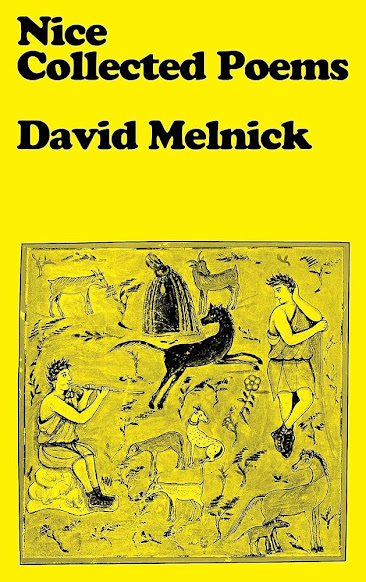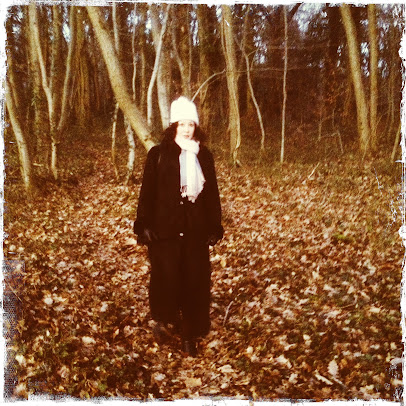I found Melnick’s work after moving to Berkeley, where he lived in the late 1960s and early ‘70s before moving across the Bay to San Francisco. I had heard tell of his readings of PCOET—his “correct” pronunciations, how only a few could remember the exact sounds his private language formed. I had heard of his famous Homer Group, and read how Melnick’s voice was infectious among the other “Homersexuals,” how his homophonics perversely instigated a kind of Bacchic frenzy. I remember being shown an event flyer from 1974, from the now-defunct Cody’s Books, featuring Melnick reading with Telegraph’s “Bubble Lady,” Julia Vinograd. I would walk past the former Cody’s building daily to feel their presences decades after.
Melnick’s work
created a kind of orbit, tugging me to its center, but the force that propelled
my obsession was impossible to see. Was it that Melnick gave language to queer
feelings I had known somewhere deep inside me, but had been unable to voice?
Was it that his work points to a kind of unspeakability of these very “qqrer!”
feelings? I am left wondering what kinds of queer feelings we can represent in
queer (il)legibilities. Whether Melnick offers us a cipher, a code, a means of
reckoning with language and its limits, feelings and the limits of representing
those feelings, too. (Noah Ross, “(POETS; EXIST?”)
I hadn’t even heard of San Francisco poet David Melnick (1938-2022) before this new collection landed in my mailbox—Nice: Collected Poems, eds. Alison Fraser, Benjamin Friedlander, Jeffrey Jullich & Ron Silliman (New York NY: Nightboat Books, 2023)—a book that includes preface on the author by poet and critic Noah Ross [see my ’12 or 20 questions’ with him here; see my review of his second collection here], and a collaborative introduction-proper by the four editors. I’m fascinated by these seeming-reclamation projects that American publisher Nightboat Books has been publishing over the past decade or so (possibly longer, but I’ve only been aware of their work for the past dozen-plus years), all of which swirl around particular writers and writings, allowing documentation for a wealth of literary activity, specifically: by, about and through queer writers and writing. Some of the collections I’ve been particularly impressed by include their Beautiful Aliens: A Steve Abbott Reader, edited by Jamie Townsend with an afterword by Alysia Abbott (2019) [see my review of such here], We Want It All: An Anthology of Radical Trans Poetics, eds. Andrea Abi-Karam and Kay Gabriel (2020) [see my review of such here] and Writers Who Love Too Much: New Narrative 1977-1997, eds. Dodie Bellamy and Kevin Killian (2017) [see my review of such here]. I’d probably also include the collection On Autumn Lake: The Collected Essays (2022) by American poet and critic Douglas Crase [see my review of such here] to this list as well. There is something to be acknowledged and appreciated in Nightboat’s ongoing attentions to providing critical consideration, examination and celebration to these histories that might otherwise have been overlooked, misunderstood or even completely forgotten. As the first poem of Melnick’s posthumous collection, the five-page “I. LE CALME,” ends:
These languages pass away:
:fellatio, of subjection
now kings are dead
because
the head is lowered
“eyes ripe as olives
“a green sea
knobby
bit by worms
stirred, in
the main stream
“bee keeper
seized the earth
“size of a star
Walking, sorrow slew me
Nice: Collected Poems collects four previously-published limited-edition works by Melnick across nearly fifty years of scattered production: Eclogs (Ithica House, 1973), PCOET (G.A.W.K., 1975), Men in Aïda (Tuumba Press, 1983) and A Pin’s Fee (Logopoeia website, 2002; Hiding Press, 2019). There’s a liveliness to this work, one that sweeps unapologetically into experimentation and the playfully-ridiculous, a quality that is quite refreshing; the earlier works clearly showcase a poet of his period, employing a particular flavour of 1960s and 70s experimentation, but somehow timeless, offering an expansive play across meaning, sound and the lyric through a poetics of subverted and invented language. It would be impossible not to be simultaneously charged and charmed by the expansive heft of the poem “Men in Aïda,” a homophonic translation of the Iliad, a piece that can’t not be heard aloud, even from within the bounds of quiet reading. The language really is propulsive, and my ears can catch comparisons with language/sound poets north of the border, from bpNichol and Christian Bök to The Four Horsemen, Gary Barwin and Gregory Betts (among others). Such glorious gymnastics of sound! As Melnick’s poem begins:
Men in Aïda, they appeal,
eh? a day, O Achilles!
Allow men in, every
Achaians. All gay ethic, eh?
Paul asked if tea mousse
suck, as Aïda, pro, yaps in.
Here on a Tuesday. ‘Hello,’
Rhea to cake Eunice in.
‘Hojo’ noisy tap as
hideous debt to lay at a bully.
Ex you, day. tap wrote a ‘D,’
a stay. Tenor is Sunday.
Arreides stain axe and
Ron and ideas ‘ll kill you.
Moving through the material, I’m simultaneously surprised and not that I hadn’t heard of this poet before this book landed, making me wonder just how much material exists in the world by those otherwise-forgotten writers? We move so quickly to the next book and the next book that there are probably dozens of poets left behind: “only alive as long as in print,” to paraphrase a line by the (since late) Canadian poet Patrick Lane. So much literary history is unrecorded and overlooked, and this is a wonderfully vibrant collection, even through the dark elements of Melnick’s later work, as the collaborative “INTRODUCTION” writes:
In parallel with his life, Melnick’s poetry also yields story, a compact one. Four books comprise his legacy: Eclogs (written 1967-1970), PCOET (mostly 1972), Men in Aïda (1983), and A Pin’s Fee (1987). As the dates of composition show, his years of creativity span a crucial two decades in the rise of queer community: his first book begun before Stonewall; his last written in the crisis years of AIDS. And each book reflects a truth of its moment, though in a manner entirely its own. In Eclogs, the beautiful façade of coded language preserves an experience it screens from view. PCOET yields to the joy of invention, creating a language all its own. Men in Aïda, the pinnacle of this span, is his epic: an act of gay worldbuilding, embracing the past and transforming it through homophonic translation. A Pin’s Fee, the shortest of the four, is anguished: its last word, “DEATH, “ repeating forty-five times. After this, nothing. For the rest of Melnick’s life, another thirty-five years, no other poetry would surface.





